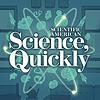
Science, Quickly
Scientific American
Categories: Science & Medicine
Listen to the last episode:
In this week's science roundup: drinking raw milk was always risky, but now there are added concerns over the spread of bird flu into dairy cows. An intense geomagnetic storm led to stunning auroras across the globe last week–and similar storms could mess with satellites and electricity infrastructure. Plus, hurricane forecasts are on the horizon. Email us at sciencequickly@sciam.com if you have any questions, comments or ideas for stories we should cover! And discover something new everyday by subscribing to Scientific American or signing up for our daily newsletter. Science Quickly is produced by Rachel Feltman, Kelso Harper, Carin Leong, Madison Goldberg and Jeff DelViscio. This episode was hosted by Rachel Feltman. Our show is edited by Elah Feder, Alexa Lim, Madison Goldberg and Anaissa Ruiz Tejada, with fact-checking by Shayna Posses and Aaron Shattuck. The theme music was composed by Dominic Smith. Learn more about your ad choices. Visit megaphone.fm/adchoices
Previous episodes
-
3041 - AI Is Getting Creepier and Risky Cheese Is Getting TrendierMon, 20 May 2024
-
3040 - Troubled Waters on Cape Cod: Loved to Death (Part 1)Fri, 17 May 2024
-
3039 - A Citrus-Scented Cannabis Compound Reduces Anxiety for Weed UsersWed, 15 May 2024
-
3038 - The Internet Is Full of Deepfakes, and the Sky Is Full of TrashMon, 13 May 2024
-
3037 - Introducing Science Quickly’s New Host, Rachel FeltmanFri, 03 May 2024
-
3036 - Can Food Work as Medicine?Wed, 01 May 2024
-
3035 - Corals Are Once Again Bleaching En Masse, but Their Fate Isn’t SealedMon, 29 Apr 2024
-
3034 - Episode 3: A Long-Awaited Climate Experiment Is Poised to Launch in the Amazon. What Will It Find?Fri, 26 Apr 2024
-
3033 - Episode 2: A Singular Climate Experiment Takes Shape in the AmazonWed, 24 Apr 2024
-
3032 - Episode 1: Will the Amazon Help Save the Planet?Mon, 22 Apr 2024
-
3031 - How Big a Threat Is Bird Flu?Fri, 19 Apr 2024
-
3030 - How a New AI Model Helps Volcanic History Rise from the AshesWed, 17 Apr 2024
-
3029 - Do Sperm Whales Have Culture?Mon, 15 Apr 2024
-
3028 - Measles Is Back, and That’s ScaryFri, 12 Apr 2024
-
3027 - Did the Eclipse Give You the Amateur Astronomy Bug? Here’s How to Get StartedWed, 10 Apr 2024
-
3026 - A Veteran Eclipse Chaser Explains the Thrill of TotalityMon, 08 Apr 2024
-
3025 - Three Times Eclipses Eclipsed Previous ScienceFri, 05 Apr 2024
-
3024 - Humans Find Total Eclipses Startling. What About a Komodo Dragon?Wed, 03 Apr 2024
-
3023 - Inside the Race to Protect Artists from Artificial IntelligenceMon, 01 Apr 2024
-
3022 - The Tale of the Snail Slime WranglerFri, 29 Mar 2024
-
3021 - Mucus Saves Your Life Every DayWed, 27 Mar 2024
-
3020 - Magical Mucus: On the Benefits of Getting Slimed by a HagfishMon, 25 Mar 2024
-
3019 - How Artificial Intelligence Helped Write this Award-Winning SongFri, 22 Mar 2024
-
3018 - Why Short Naps Are Good for YouWed, 20 Mar 2024
-
3017 - The Great Debate: Could We Ever Travel through Time?Mon, 18 Mar 2024
-
3016 - The Science behind Humpback Whales’ Eerie SongsFri, 15 Mar 2024
-
3015 - Large Study of ME/CFS Patients Reveals Measurable Physical ChangesThu, 14 Mar 2024
-
3014 - Hunger in Gaza Could Affect Survivors' Health for DecadesMon, 11 Mar 2024
-
3013 - These Invasive Ants Are Changing How Lions HuntFri, 08 Mar 2024
-
3012 - Should You Swab Your Throat Plus Your Nose for COVID?Mon, 04 Mar 2024
-
3011 - Is This the Earliest Evidence of Human Cannibalism?Fri, 01 Mar 2024
-
3010 - What Do You Mean, Bisexual People Are ‘Risk-Taking’? Why Genetic Studies about Sexuality Can Be FraughtWed, 28 Feb 2024
-
3009 - Asexuality Research Has Reached New Heights. What Are We Learning?Fri, 23 Feb 2024
-
3008 - How to Close the Orgasm Gap for Heterosexual CouplesWed, 21 Feb 2024
-
3007 - Dominatrices Are Showing People How to Have Rough Sex SafelyFri, 16 Feb 2024
-
3006 - How to Explore Your Sexuality, according to ScienceWed, 14 Feb 2024
-
3005 - You Can't Fix Burnout With Self-CareMon, 12 Feb 2024
-
3004 - How April’s Eclipse Will Solve Solar MysteriesFri, 09 Feb 2024
-
3003 - When Will We Finally Have Sex In Space?Wed, 07 Feb 2024
-
3002 - How Is This Ancient Cattle Breed Fighting Wildfires in Portugal?Mon, 05 Feb 2024
-
3001 - The Government's Former UFO Hunter Has a Lot to SayMon, 05 Feb 2024
-
3000 - Quantum Computers Might Make All of Your Private Data Less SecureWed, 31 Jan 2024
-
2999 - For 60+ years, respiratory syncytial virus (RSV) vaccines have evaded scientists. But now that's changed [Sponsored]Tue, 30 Jan 2024
-
2998 - New IVF Test Could Increase Chances of Pregnancy SuccessMon, 29 Jan 2024
-
2997 - How to Save Indigenous LanguagesSat, 27 Jan 2024
-
2996 - Civil War Vaccine May Have Lessons for COVID-19Mon, 20 Jul 2020
-
2995 - Why Some Birds Are Likely To Hit BuildingsMon, 13 Jul 2020
-
2994 - Sparrow Song Undergoes Key ChangeSat, 11 Jul 2020
-
2993 - COVID Has Changed Soundscapes WorldwideSun, 31 May 2020
-
2992 - Colorful Corals Beat BleachingWed, 27 May 2020























